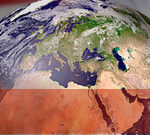NCAA Quiz: 1) Name the starting five of the 1982 NCAA
Champion North Carolina Tarheels. 2) Who is the only ACC
player, besides Michael Jordan, to lead the NBA in scoring?
Answers below. [I went to the ACC tourney last week. You
can”t expect me to ask SEC questions, can you?]
Johnnie Mac”s Grandpa
This St. Patty”s Day let”s remember Dan McCarthy, captain of
the Kerryman, the Gaelic football champs in 1903 and 1904. As
J Mac says, Gaelic football is sort of like rugby with an attitude.
Dan Mac developed a scissor kick that bore him the nickname
Dan “Airplane” McCarthy (quite an achievement since the
Wright Brothers didn”t fly until 1903). So let”s quaff a pint to
Ol” Dan.
The Potato Famine, Part II
In 1845, as alluded to in my last piece, the Irish peasants had no
security and little incentive to work. Left with this choice they
frequently joined the British army. The Duke of Wellington
once said, “Ireland is an inexhaustible nursery for the finest
soldiers.”
For those who spent their days just struggling to survive, the
poverty was incredible. Large families lived in mud huts with no
furniture and the company of pigs.
In the first year of the famine, the poorest of the peasants
sold whatever they could – overcoats, fishing gear, the family
cow, Chieftains albums – to buy grain. The next year, as the
famine returned, they had nothing left to sell. The fishermen, if
they hadn”t already sold their gear, were too weak to row.
People combed the beaches for shellfish until every beach in the
West was stripped bare. And to top it off, food prices began to
soar.
In July 1846, there was a new person in charge of famine relief,
Charles Trevelyan, a man who believed that government must
never interfere with the hidden hand of the market. According to
author Cahill, Trevelyan felt that “if the Irish were starving, it
must be their own fault; and God himself had sent the potato
blight for the ”moral and political improvement” of the Irish
people. They must take control of their own lives and stop
abusing British charity.”
So the stage was set for the worst year, 1847. Only 2 million
tons of potatoes were produced, versus 15 million tons in 1844,
the year before the famine began. Cahill writes:
“The Irish obliged Charles Trevelyan”s ideals for them by dying
in droves, whole villages becoming ghost towns overnight.
Serious riots broke out at ports, where hungry people could not
bear the sight of abundant Irish grain and meat being loaded on
ships for export. Her majesty”s government, which refused to
commit the sin of interfering with the market, had no scruples
about protecting the market”s many export ships with the full
force of British firepower.”
Private charities, such as Quaker soup kitchens, were
overwhelmed. Bands of walking skeletons began to roam the
countryside. There were corpses in the fields and children dying
in the workhouses, the latter being hellholes where even small
children could be deprived of food and placed in solitary
confinement. A Quaker wrote of the time:
“We entered a cabin. Stretched in one dark corner, scarcely
visible from the smoke and rags that covered them, were three
children huddled together, lying there because they were much
too weak to rise, pale and ghostly, their little limbs perfectly
emaciated, eyes sunk, voice gone and evidently in the last stages
of starvation.”
In 1848, the crop failed again, people gathered what little
strength they had and left to walk to the ports. Norman Davies,
in his book, “Europe: A History,” writes, “They collapsed on the
roads, perished in the overcrowded steerage holds, and died in
droves on the docks of New York and Montreal. They landed
racked with fever, stomach cramps, and ”Anglophobia.”” A poet
wrote:
A million a decade! Calmly and cold
The units are read by our statesman sage.
Little they think of a Nation old,
Fading away from History”s page:
– Outcast weeds by a desolate sea
Fallen leaves of Humanity!
In conclusion, a minister wrote, “The Almighty indeed sent a
potato blight, but the English created a Famine.”
[The fungus that caused the blight was a microscopic organism.
The spores traveled through the air with lightning speed
whenever the weather was warm and wet (in other words, 95%
of the time in Ireland), attacking crops, decimating whole fields
within hours, and rotting the potatoes to a foul-smelling mush.
As Cahill wrote, “The sickening odor, carried on the breeze of
late summer, became the perfume of death itself.” Finally, in
1885, a commercially salable pesticide was developed.]
U2 / Bloody Sunday
U2 was formed in 1978 in Dublin. Paul Hewson (Bono), Adam
Clayton, Larry Mullin and Dave “The Edge” Evans began
rehearsing while students at Dublin”s Mount Temple High
School after Mullin placed a note on the school message board
asking for volunteers to form a band. They originally called
themselves “Feedback” and then “The Hype.”
As you can imagine, they started out playing local gigs and early
on there was an ad in a local newspaper.
“Manager seeks the whereabouts of The Hype after amazing
Howth gig. [Howth is a beautiful suburb of Dublin. If you get to
Dublin, take a little commuter train ride out there and tell ”em
Trumbore sent you]. Please ring Brian. It was great lads.” The
ad was placed by Adam Clayton in the hope that it would get the
band more gigs. [The guys who hyped the “Blair Witch Project”
must have learned from Clayton].
After a slow start in the album biz, U2 took off and by 1985
Rolling Stone proclaimed the group “Band of the 80s.” Around
this time they made a historic appearance at Live Aid.
U2 was known early on for tackling social and spiritual issues.
Their third album, “War,” cemented their reputation as a
politically conscious band. Addressing “the troubles” in
Northern Ireland, they introduced a tune, “Sunday, Bloody
Sunday,” at a concert in Belfast.
Bloody Sunday was one of the more tragic, and controversial,
events of the conflict in the North. On January 30, 1972, there
was a large civil rights march in Derry. The march had been
banned. Suddenly, British soldiers began to fire on what had
been a peaceful demonstration of Catholic disenchantment with
British (“Home”) rule. When it was over, 13 unarmed protesters,
6 of whom were 17-years-old, died (a 14th died later from their
injuries).
The first tribunal to investigate the tragedy assigned blame to the
victims. After all of these years, a new inquiry is being
launched, but it is doubtful justice will be served.
There were 29 guns that were believed to have been fired by
British soldiers on Bloody Sunday. Despite instructions to
safeguard them, 16 have been destroyed and 10 sold to private
companies. Recently, a ballistics expert has concluded that part
of the massacre was pre-meditated. But it will be difficult to
prove this without all of the evidence being intact.
But back to U2. In 1987, the group hit superstardom with the
release of the album, “The Joshua Tree,” which topped the charts
for weeks and spurned the #1 hits, “With or Without You” and “I
Still Haven”t Found What I”m Lookin” For” (my personal
favorite). Joshua Tree won the Grammy for Album of the Year.
Just a tidbit or two concerning U2 concert gigs. Way back in
1981, they were the supporting attraction at a Miss Wet T-Shirt
night in Dallas, TX. In 1992, during a concert at the Palace in
Auburn Hills, MI., Bono ordered 10,000 pizzas to go from
Speedy Pizza. An hour later, 100 arrived with 3 delivery men,
each of whom received a $50 tip. And, here”s some trivia, U2
was only the second concert act to ever perform at Yankee
Stadium (1992). Billy Joel was the first.
Bono has always been known for being levelheaded, despite his
incredible stardom. Early in his career, he said to an interviewer,
“We may well be the future of rock but so what? When I go
back to Dublin, to my girlfriend it”s more of a distraction that
I”m in a band than any big deal – and my old man still shouts at
me for not doing the dishes before I go to bed.”
Top 3 songs for the week of 3/13/65: #1 “Eight Days A Week”
(Beatles) #2 “My Girl” (Temptations) #3 “Stop! In The Name
Of Love” (Supremes…now there is a powerful Top 3).
So you wanna feel old? Last Wednesday Mike Love turned 59
while Sly Stone celebrated his 56th birthday.
Quiz Answer: 1982 Champs – James Worthy (15.6 ppg), Sam
Perkins (14.3), Michael Jordan (13.5.his freshman year), Matt
Doherty (9.3), Jimmie Black (7.6). 2) Bob McAdoo (UNC grad)
led the NBA in scoring 3 straight years while playing for the
Buffalo Braves, 1974-76, with averages of 30.6, 34.5 and 31.1
respectively.
Next Bar Chat, Monday…if you keep it where it is.





